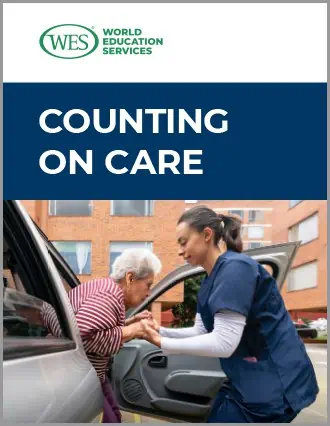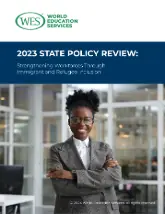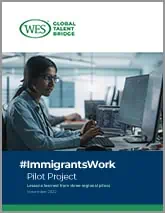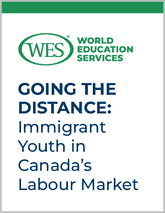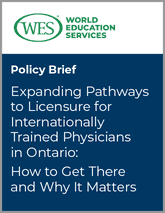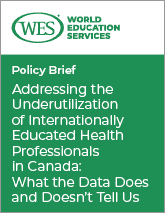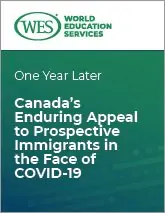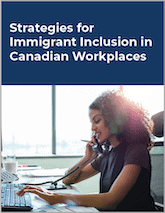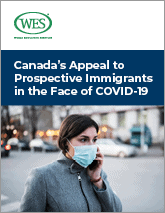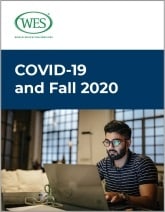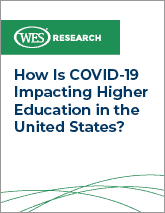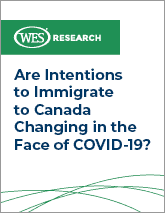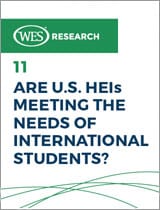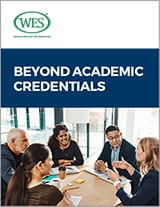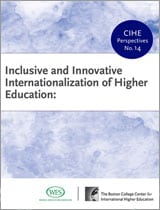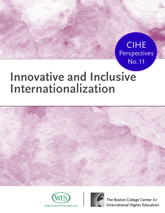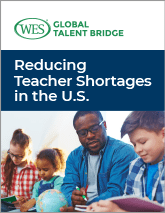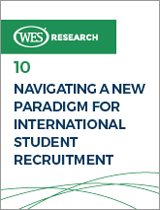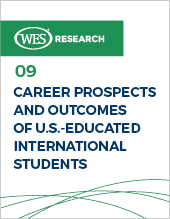Research Topics
Browse research reports and other research-based documents from the WES Research team and WES Global Talent Bridge.
Counting on Care: Understanding Underemployment Among Internationally Educated Nurses in Ontario
(March, 2024)This report describes the registration status, employment outcomes, and nursing skills utilization for 758 IENs not currently working as nurses in Ontario. The findings in this report add to the existing data landscape on IENs in Ontario and contribute to ongoing research into the state of its health care workforce.
2023 State Policy Review: Strengthening Workforces Through Immigrant and Refugee Inclusion
(March, 2024)This report reviews state-level policy reforms enacted in 2023 to advance more equitable educational and workforce opportunities and outlines inclusive measures that state policymakers can promote during 2024 state legislative sessions and beyond.
#ImmigrantsWork Case Study: Lessons Learned from Three Regional Pilots
(May, 2023)This paper presents key findings and lessons learned from three regional pilot projects aimed at testing the effectiveness of engaging employers in creating customized versions of practical resources designed to attract, engage, and retain immigrant talent. The paper includes feedback from the participating regions and employers in the Regional Municipality of Waterloo, the Regional Municipality of Durham, and Greater Moncton.
Going the Distance: Immigrant Youth in Canada’s Labour Market
(February, 2023)This report examines the disparity between the high levels of academic success immigrant and refugee youth achieve and the challenges they encounter when seeking to enter the workforce. It also provides several programmatic and policy recommendations to facilitate the inclusion and long-term advancement of immigrant and refugee youth.
Expanding Pathways to Licensure for Internationally Trained Physicians in Ontario: How to Get There and Why It Matters
(January, 2023)This policy brief examines the investments required and benefits to be realized by implementing three measures that can improve access to care, equity, and sustainability within Ontario’s health care workforce.
Addressing the Underutilization of Internationally Educated Health Professionals in Canada: What the Data Does and Doesn’t Tell Us
(March, 2022)This policy brief can help researchers and policymakers understand the extent of skill underutilization of IEHPs, the scope and the limitations of existing data, and where improvements can be most impactful.
One Year Later: Canada’s Enduring Appeal to Prospective Immigrants in the Face of COVID-19
(January, 2022)This new research report compares findings from surveys of prospective immigrants distributed in August 2020 and August 2021. It reveals the extent to which people are still interested in immigrating to Canada and key factors influencing their interest.
Stratégies d’inclusion des immigrants dans les milieux de travail canadiens
(August, 2021)Le Guide de l’employeur vise à offrir des stratégies faciles à mettre en œuvre qui facilitent vos efforts en vue de recruter les meilleurs candidats pour faire traverser cette période turbulente à votre organisation; ajouter des points de vue diversifiés pour consolider la résilience de votre entreprise; promouvoir un milieu de travail inclusif où les immigrants peuvent s’épanouir.
Strategies for Immigrant Inclusion in Canadian Workplaces
(May, 2021)This employer playbook is a collection of accessible, easy-to-implement strategies and tips to help employers bolster immigrant inclusion as they respond to and recover from the COVID-19 pandemic.
Impact of COVID-19 on the Economic Well-Being of Recent Migrants to Canada
(December, 2020)This research report examines the economic impact of the COVID-19 pandemic on permanent residents, temporary foreign workers, and international students in Canada. The results are based on surveys distributed in April, June, and August of 2020 to applicants who received a WES credential evaluation and resided in Canada. Nearly 5,000 responses were included in the analysis.
Trend Report: Canada’s Appeal to Prospective Immigrants in the Face of COVID-19
(November, 2020)This report looks at trends from all three survey rounds (April, June, and August of 2020) and is based on the responses of more than 27,000 respondents who resided outside of Canada at the time of the surveys. Gain insight into how interest and intentions to immigrate to Canada are changing over time as the pandemic unfolds.
COVID-19 and Fall 2020: Impacts on U.S. International Higher Education
(November, 2020)This report details the final results of a series of surveys on the impact of COVID-19 on U.S. international higher education in fall 2020 and beyond. The report is based on results from surveys conducted in June and August of 1,244 prospective students, divided into two groups: prospective international students, who require a student visa; and internationally educated immigrants interested in enrolling at U.S. colleges and universities, who hold some form of permanent immigrant status.
How Is COVID-19 Impacting International Higher Education in the United States?
(July, 2020)To understand the potential impact of the coronavirus on U.S. international higher education, WES Research surveyed prospective international and immigrant students interested in studying in the U.S.; and U.S. higher education professionals who work in various areas, such as admissions and student services, to support international and immigrant students. This report is based on the survey responses of 615 prospective international and immigrant students and 199 higher education professionals.
Hosting a Refugee Hiring Event: A Guide to Coordinating a Collaborative Response to an Employment Imperative
(June, 2020)This practical guide summarizes key lessons from the Toronto Refugee Hiring Event and provides communities across Canada with a blueprint for hosting similar events to maximize matching refugees with hiring employers.
Are Intentions to Immigrate to Canada Changing in the Face of COVID-19?
(June, 2020)To understand the potential impact of the COVID-19 pandemic on prospective immigrants to Canada, WES Research conducted a survey of applicants for a WES Educational Credential Assessment (ECA) for immigration purposes. The report is based on the responses of 4,615 individuals residing outside of Canada and provides insight into how the pandemic is affecting their immigration interest and intentions.
Who Is Succeeding in the Canadian Labour Market? Predictors of Career Success for Skilled Immigrants (2019)
(December, 2019)This report examines the demographic characteristics of skilled immigrants as well as their experience and education, and how these factors affect their labour market outcomes. It is intended to inform Canadian policy and practice with respect to skilled immigrants, and to increase awareness among prospective immigrants of the factors that are associated with labour force success.
Are U.S. HEIs Meeting the Needs of International Students?
(November, 2019)To provide insight into international student experiences in the U.S., WES Research conducted a survey of 1,921 current students and recent graduates and consulted with 24 current students through an online focus group. The resulting report, based on data collected in 2019, provides an overview of student perceptions regarding various aspects of the student experience, including on-campus relationships, identity acculturation, and daily life. The report also includes recommendations for how institutions can better serve international students.
Beyond Academic Credentials—Toward Competency-Informed Hiring
(November, 2019)This paper focuses on the potential of competency assessment to support the long-term growth of the labour market by facilitating the appropriate employment of skilled immigrants. A competency-informed approach involves looking holistically at an individual’s ability to apply knowledge and skills with appropriate judgment in a defined setting.
Perspectives on Innovative and Inclusive Internationalization
(November, 2019)It is our great pleasure to present the proceedings of the 2019 WES-CIHE Summer Institute on Innovative and Inclusive Internationalization, a joint initiative of World Education Services (WES) and the Center for International Higher Education (CIHE) at Boston College.
Innovative and Inclusive Internationalization
(January, 2019)In collaboration with the Boston College Center for International Higher Education (CIHE), WES presents a series of studies on aspects of internationalization in higher education. The articles are based on research in transnational education, internationalization trends, institutional experiences, and more presented at the 2018 WES-CIHE Summer Institute.
Can Immigrant Professionals Help Reduce Teacher Shortages in the U.S.?
(November, 2018)This report explores the role that immigrant and refugee professionals can play in addressing these urgent shortages – and increasing the diversity of the teacher workforce – through alternative teacher certification programs that tap into these newcomers’ training, skills, and professional experience. The report looks at developing initiatives in several states and cities as well as relevant federal policies. It also offers wide-ranging recommendations for promising program and policy models, and how local, state, and national education stakeholders can work together to leverage the unique assets that immigrant professionals bring to addressing the needs of schools and students across the U.S.
Navigating A New Paradigm For International Student Recruitment
(May, 2018)On campuses across the nation, recent changes to U.S. immigration policies have led to declining interest and enrollments among international students. To learn more about the impact and how institutions are responding, WES surveyed 139 international enrollment management professionals in early 2018.
A Way Forward for Refugees: Findings from the WES Pilot Project
(May, 2018)When WES launched a pilot project in 2016 to assess the credentials of Syrian refugees to Canada, millions of people had already fled conflicts in nations around the world. They had streamed across borders throughout Europe and the Middle East, creating an unprecedented wave of displaced people in distress. Between November 2015 and February 2016, the Government of Canada settled more than 26,000 Syrians from Lebanon, Jordan, and Turkey. By June 2017, almost 47,000 had arrived in Canada – to a sustained outpouring of public support. This report describes how World Education Services has begun to help those with post-secondary qualifications take their next steps toward integration.
Career Prospects and Outcomes of U.S. Educated International Students: Improving Services, Bolstering Success
(October, 2017)This report examines the career expectations and outcomes of international students and alumni educated at U.S. higher education institutions, including the experiences of alumni who stayed in the U.S. and those who returned home.
